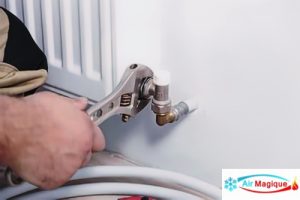Radiator leaks can lead to loss of heating efficiency, water damage, and potential safety hazards. Addressing radiator leaks promptly is very important to maintain a well-functioning heating system and prevent further damage. This blog post is about the common causes of radiator leaks, methods to detect them, and effective solutions for repairing the leaks and restoring your radiator’s performance.
Causes of Radiator Leaks:
- Corrosion: Over time, the internal components of a radiator can corrode, leading to tiny holes or cracks in the metal. Corrosion is a common cause of radiator leaks, especially in older systems or radiators made from materials prone to rusting, such as cast iron.
- Loose Joints or Connections: Poorly sealed joints and connections between radiator components can result in leaks. Over time, these connections can become loose due to thermal expansion and contraction, causing water to seep through gaps.
- Physical Damage: Accidental impacts or external forces can cause physical damage to the radiator, leading to cracks or holes that permit water to leak.
Detection of Radiator Leaks:
- Visual Inspection: Begin by examining the radiator for any visible signs of water leakage, such as puddles or stains around the base or along the radiator’s surface.
- Pressure Test: A pressure test is an effective method performed by HVAC professionals to identify radiator leaks. By pressurizing the radiator system, technicians can detect leaks as water is forced out through any openings.
- Radiator Refill: If you find that your radiator requires frequent refilling, it could indicate a leak in the system. Regularly checking the water level can help detect potential leaks early.

Solutions for Radiator Leak Repair:
- Patching and Sealants: For small leaks or cracks, patching materials and sealants designed for radiator repair can be effective temporary solutions. These products help seal the leak, preventing further water loss.
- Replacement of Damaged Components: If the radiator leak is due to corroded or irreparably damaged parts, replacing the affected components or the entire radiator may be necessary. Modern radiators made from materials like aluminum are less prone to corrosion and may provide a more durable solution.
- Professional Repair Services: For larger or hard-to-reach leaks, it is recommended to seek the expertise of a licensed HVAC technician. Professionals have the knowledge, tools, and experience to identify and repair radiator leaks efficiently and safely. Leave this work to Air Magique!
Prevention Tips:
- Regular Maintenance: Schedule regular radiator maintenance to catch potential issues early and prevent leaks from worsening.
- Proper Water Treatment: Using appropriate water treatment additives can help reduce the risk of corrosion within the radiator system.
- Gasket and Joint Inspection: Inspect and maintain gaskets and joints regularly to ensure a secure seal and prevent leaks.
